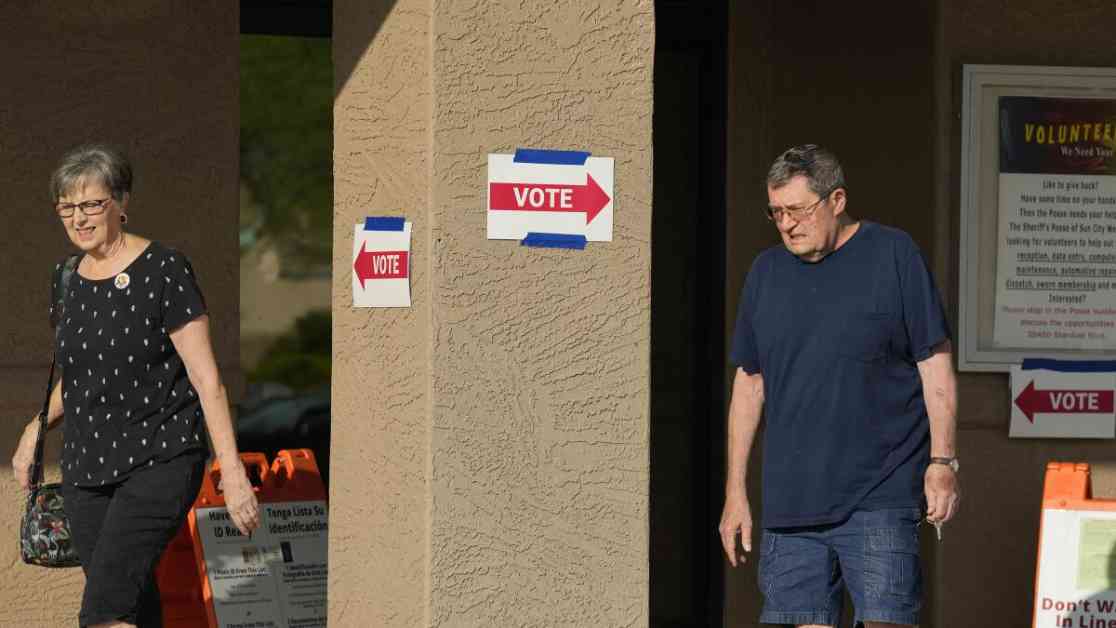Arizona Voter Registration System Error Impacts Nearly 100,000 Voters
Nearly 100,000 Arizona residents find themselves in a state of limbo as a recent error in the voter registration system has thrown a wrench into the upcoming state and local elections. Election officials discovered the issue just weeks before the highly anticipated election day, sparking concerns and legal actions.
The unique requirement in Arizona mandates voters to provide proof of citizenship for state and local elections, a stipulation that has stirred controversy in the past. Despite minimal evidence of noncitizens attempting to vote, the state stands firm on this rule. Maricopa County Recorder Stephen Richer revealed that a substantial number of individuals, totaling 97,688 statewide, were listed as registered for the full ballot without submitting the necessary documentation.
Richer, a Republican, wasted no time in taking legal action against Arizona Secretary of State Adrian Fontes, a Democrat, to address the dilemma. With approximately 4.1 million registered voters in Arizona, the issue at hand is urgent, especially as the state prepares to send out its first ballots to military and overseas voters.
The Requirement for Proof of Citizenship in Arizona
Arizona stands out as the only state in the nation that demands documented proof of citizenship from voters participating in state and local elections. This stringent regulation stemmed from the passing of Proposition 200 in 2004, mirroring California’s Proposition 187, during a period of heightened scrutiny on illegal immigration in the border state.
Individuals registering to vote in Arizona must choose between two forms: one as a federal-only voter without proof of citizenship or as a full ballot voter with documented evidence. The controversy surrounding this requirement has persisted over the years, leading to the current predicament faced by nearly 100,000 voters.
Uncovering the Error in the System
The voter registration system in Arizona previously relied on driver’s licenses issued after 1996 as proof of citizenship for most applicants. However, a flaw in the system allowed certain individuals to slip through the cracks. For instance, someone who obtained a driver’s license before 1996 but later obtained a duplicate license could inadvertently be deemed to have provided proof of citizenship based on the updated issuance date.
The discovery of a noncitizen registered to vote for a full ballot prompted an immediate review by county and state officials. Governor Katie Hobbs acknowledged an administrative error that originated in 2004, affecting long-time residents who received driver’s licenses prior to 1996. The rectification of this back-end error resolved the technical issue but raised questions about the affected voters’ eligibility for the upcoming election.
Divided Opinions on Resolution
The dilemma surrounding the 97,000 individuals registered to receive a full ballot without proof of citizenship has sparked a debate among elections officials. Fontes advocates maintaining the status quo until after the November election, allowing these voters to participate fully. Conversely, Richer contends that these registrants should only receive a federal-only ballot, adhering to legal requirements.
The implications of this dispute extend beyond individual voters to crucial state races in Arizona, including significant measures like abortion access. With the Arizona Supreme Court called upon to issue a prompt ruling, the fate of these voters hangs in the balance as the election draws near.
Guidance for Arizona Voters
As the legal battle unfolds, voters in Arizona are advised to stay informed and await further instructions. Fontes reassures voters that they will be contacted promptly and that a portal will be established for submitting proof of citizenship if deemed necessary. Regardless of the court’s decision, early voting is encouraged to ensure participation in the electoral process.
The Political Context of Proof of Citizenship
Former President Trump’s unfounded claims of widespread illegal immigrant voting have reignited discussions around proof of citizenship requirements. Despite repeated debunking by election officials, the issue remains contentious, with efforts to implement nationwide proof of citizenship measures gaining traction.
House Speaker Mike Johnson’s push for the SAVE Act, which mandates proof of citizenship for voting, underscores the ongoing debate surrounding voter eligibility. The intersection of these political dynamics with the controversy in Arizona highlights the broader implications of voter registration laws and their impact on democratic processes.
In conclusion, the error in Arizona’s voter registration system has cast a shadow of uncertainty over the upcoming elections, affecting nearly 100,000 voters. As legal battles ensue and decisions are made, the importance of upholding the integrity of the electoral process remains paramount. Voters are urged to stay engaged, informed, and proactive in ensuring their participation in shaping the future of Arizona’s political landscape.



























